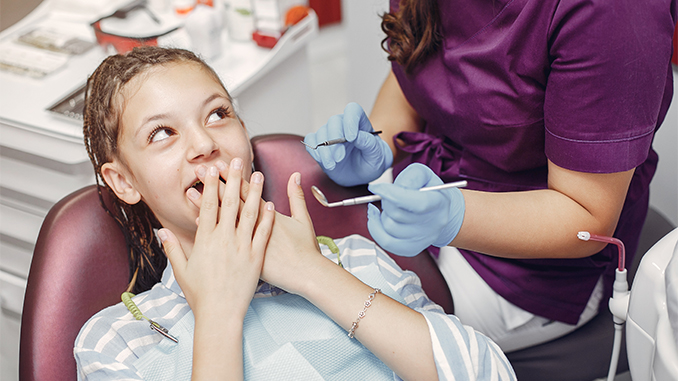
Tips on how you can make the dentist a not-so-scary place.
Published: October 9, 2024
For children (and adults), alike, the dentist can be a scary place to visit. Mysterious drilling sounds, gargling, and beeping can be heard echoing through the hallways, and for a young child, this can be an overwhelming experience. While it’s crucial to keep up with six-month cleanings, it can often feel like pulling teeth to get your child into the dentist’s chair. Fear not parents, we have some tips on how you can make the dentist a not-so-scary place.
Keep the Details Short and Sweet
Visiting the dentist can be filled with a lot of unknowns like cavities, dental procedures, or even tooth removal. In order to keep your child calm, try to use details about the visit sparingly. Keep the conversation lighthearted and positive, and maybe even promise a fun treat after it’s all over.
Choose Words Carefully
Going to the dentist can be an uncomfortable experience. Needles, x-rays, and other foreign tools can be scary to kids. Try to avoid going into too much detail about what the dentist is going to do, or how scary some of it might be, or even saying things like “this might hurt a little.” Instead, let the dentist or dental assistant provide your child with explanations about certain tools, or what they are going to be doing.
Bring Distractions
Sometimes, anxiety is unavoidable in a new environment. To make it easy for your child, bring toys or games along for them to distract themselves with. When it comes time to sit in the dentist’s chair, maybe provide them with a stuffed animal to hug and comfort them while they meet with the dentist.
Make It Fun and Play Pretend
If you’re noticing your child is anxious a few days, or even weeks before the dentist, take time to get them acquainted with some of the tools. Give your child a mirror, toothbrush, and gloves, and encourage them to pretend to look at your teeth. They might even like to try this on their toys too! Remember, it’s a good way to acquaint them with new textures, tools, and experiences.
Expect Some Anxiety at the Dentist
Despite all of your efforts, your child may still be anxious once they arrive at the dentist. Remind them that anxiety is a normal feeling, and it is okay to be scared of new things. Stay calm and acknowledge your child’s fears by offering comforting words of encouragement, or even a nice hand squeeze. Bring comfort toys or activities to keep their mind off of the visit. According to Board-certified dentist, Rebecca Day, DDS says, “Pediatric dentists are trained to use several behavioral techniques to help children become comfortable at the dentist. One of these techniques is called ‘tell-show-do.’ For example, the pediatric dentist will ‘tell’ the child about the dental explorer or ‘tooth counter,’ then they ‘show’ them how to count while demonstrating on their fingernails, and finally they will actually count their teeth with the instrument.” This technique builds trust between the child and the pediatric dentist and helps the child see it is not as scary as it seems.
Encourage Healthy Teeth Habits
One of the best ways to make the dentist less scary is to remove all of the uncomfortable things that might happen at the dentist––root canals, cavity filling, or bleeding gums. Most of these things can be avoided through proper oral hygiene habits such as regular brushing and flossing, and avoiding excessive sugar. To help your child get into healthy habits, teach them the importance of brushing and flossing their teeth, and how their healthy habits can make dentist visits feel like a breeze.
Choose Child-Focused Dentists
While any dentist will take care of your child, a pediatric dentist has all of the necessary tools and training to handle child patients with patience and care. You can rest assured that your child is in good hands.
Day says, “Pediatric dentistry is important because it provides families with an avenue to fulfill the needs of their children’s oral healthcare in a fun, relaxed environment.” Pediatric dentists are specially trained to treat baby teeth, monitor growth and development and communicate with children in a way to make them comfortable.
If your child has a fear of the dentist–don’t worry! It can be natural for children to fear the unknown, new experiences, or unfamiliar faces. Instead of focusing on the negative aspects of the dentist, try to make the experience a positive one! Your child will thank you later.
